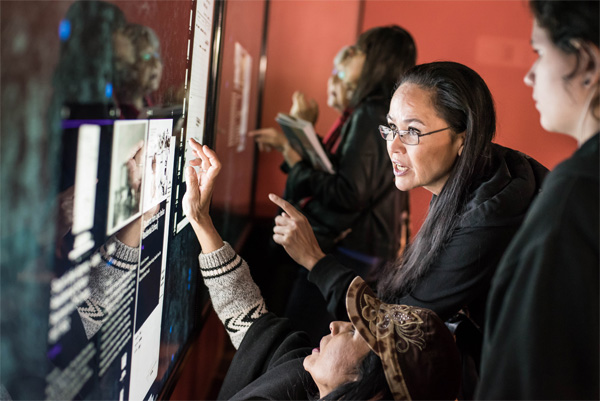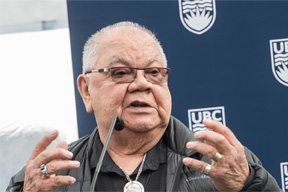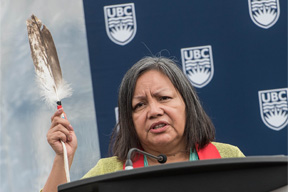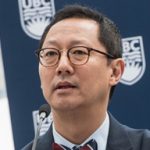
Patrons interacting with the Indian Residential School History and Dialogue Centre’s information display on opening day. Photo: UBC/Paul Joseph
April 18, 2018 – Last week, on April 9th, more than 1000 people gathered inside and outside of a protective rain shelter to witness the opening of the Indian Residential School History and Dialogue Centre, which also included UBC President Santa J. Ono apologizing to survivors of Indian residential schools for the university’s involvement in the system that supported their operation in Canada.
READ: UBC Statement of Apology
The event was also shown on Facebook Live and live-streamed on the web and combined over 11,500 video views were recorded.
“As we have worked towards the establishment of the Indian Residential School History and Dialogue Centre, we now better recognize the harm that was done to Indigenous people by the residential schools and other policies and have come to regret how little our institution and others like it did to understand what was happening, speak against it, or to teach in response to it,” said President Ono in a UBC news release.
“It is our responsibility now to address that history. The centre is evidence of UBC’s commitment and it is the most visible of many actions the university has undertaken,” he added. “It will play a significant role in focusing the university’s response to the Truth and Reconciliation Commission’s Calls to Action, which will be addressed in the university’s new strategic plan, Shaping UBC’s Next Century, and the accompanying Indigenous Strategic Plan.”
An affiliate site to the National Research Centre for Truth and Reconciliation in Winnipeg, the IRSHDC will provide Indian residential school survivors and their families and communities access to the records gathered by the Truth and Reconciliation Commission of Canada (TRC).
Related: UBC to build Indian Residential School History and Dialogue Centre
The centre will also inform faculty, staff, students, and other visitors, about the history and lasting effects of the Indian residential school system, and help them to understand larger patterns in history as a context for thinking about contemporary issues and relationships.
“The centre will also be a place of dialogue with communities about the future,” said Linc Kesler, director of the UBC First Nations House of Learning and senior advisor to the president on Aboriginal affairs.
“The involvement and guidance of Indian residential school survivors and other Indigenous community members and organizations will be critical to the ongoing work of the centre and the university and to assuring that the work we do here is relevant to community concerns. We will also work with them to ensure that the centre represents the history of survivors in ways that are accurate and respectful,” he added.
The centre, situated at the heart of campus between Koerner Library and the Irving K. Barber Learning Centre, is located on the traditional, ancestral, unceded territory of the Musqueam people.
The centre is one of two UBC initiatives that aim to capture the long trajectory of Indigenous and Canadian relations and to ensure that one part of that — the history of Canada’s Indian residential schools — will never be forgotten. The other initiative, the Reconciliation Pole, was installed on campus last year.
The two-storey, 6,500-square-foot centre was fully funded with $5.5 million in undesignated donations, which the university directed to the project.
 “The centre will give residential survivors an opportunity to tell their stories by their own choice.”
“The centre will give residential survivors an opportunity to tell their stories by their own choice.”
– Barney Williams, survivor of the Christie Indian Residential School and member of the National Centre for Truth and Reconciliation’s Survivors Circle
 “Teaching and learning about Canada’s past — including the history and the impacts of Indian residential schools — is a responsibility for all of us, not just First Nations. IRSHDC is a place where everyone, regardless of race or age, can come to learn and begin the dialogue. It is my hope that people take advantage of this centre and educate themselves so that we can all have a better understanding and help create a brighter future for generations to come. Thanks to the chiefs of B.C. for insisting that all B.C. Indian residential school records be kept in B.C. It is this dedication to the First Nations of B.C. and in the best interest of educating non-First Nations about Indian residential schools, that brought this centre to life. And thank you also to UBC President Santa Ono, former president Stephen Toope, and to professor Linc Kesler for their leadership on the IRSHDC.”
“Teaching and learning about Canada’s past — including the history and the impacts of Indian residential schools — is a responsibility for all of us, not just First Nations. IRSHDC is a place where everyone, regardless of race or age, can come to learn and begin the dialogue. It is my hope that people take advantage of this centre and educate themselves so that we can all have a better understanding and help create a brighter future for generations to come. Thanks to the chiefs of B.C. for insisting that all B.C. Indian residential school records be kept in B.C. It is this dedication to the First Nations of B.C. and in the best interest of educating non-First Nations about Indian residential schools, that brought this centre to life. And thank you also to UBC President Santa Ono, former president Stephen Toope, and to professor Linc Kesler for their leadership on the IRSHDC.”
– Cindy Tom-Lindley, former residential school student at Kamloops Indian Residential School and executive director of the Indian Residential School Survivor Society (IRSSS)
 “We commend the University of British Columbia, especially UBC President Santa Ono, for his significant efforts to bring to fruition the opening of the Indian Residential School History and Dialogue Centre. The centre will be an important reminder for Canadians and will be a valuable resource for residential school survivors. It will also serve as an important source of information in the ongoing path of reconciliation by helping to preserve the history and to tell the stories of this very dark time in Canadian history. Reconciliation in Canada can only be achieved by acknowledging our collective history. It is critical to continue to provide opportunities for Canadians to be educated about the residential school system in Canada and the deep negative impacts it had, and continues to have, on Indigenous peoples and communities across this country.”
“We commend the University of British Columbia, especially UBC President Santa Ono, for his significant efforts to bring to fruition the opening of the Indian Residential School History and Dialogue Centre. The centre will be an important reminder for Canadians and will be a valuable resource for residential school survivors. It will also serve as an important source of information in the ongoing path of reconciliation by helping to preserve the history and to tell the stories of this very dark time in Canadian history. Reconciliation in Canada can only be achieved by acknowledging our collective history. It is critical to continue to provide opportunities for Canadians to be educated about the residential school system in Canada and the deep negative impacts it had, and continues to have, on Indigenous peoples and communities across this country.”
– Grand Chief Edward John, former student of the Lejac Indian Residential School and First Nations Summit Political Executive
 “As an Indigenous student at UBC and as an intergenerational survivor of the system itself, I am pleased to witness the opening of the Indian Residential School History and Dialogue Centre. While there have been significant gaps, especially in our education systems, in learning about this part of our history, UBC students, faculty, and staff now have the opportunity to better understand and acknowledge the hard truths of Canada’s past and present. More importantly, the Dialogue Centre upholds and honours the residential school survivors, and we hold our hands up in the highest respect to each and every one of them for sharing this space with us. It is truly a historic and special day.”
“As an Indigenous student at UBC and as an intergenerational survivor of the system itself, I am pleased to witness the opening of the Indian Residential School History and Dialogue Centre. While there have been significant gaps, especially in our education systems, in learning about this part of our history, UBC students, faculty, and staff now have the opportunity to better understand and acknowledge the hard truths of Canada’s past and present. More importantly, the Dialogue Centre upholds and honours the residential school survivors, and we hold our hands up in the highest respect to each and every one of them for sharing this space with us. It is truly a historic and special day.”
– Adina Williams, intergenerational survivor and fourth-year Arts student
Video of the Event
PROGRAM OF CEREMONY
Emcee: Linc Kesler
Welcome: Elder Larry Grant
Statement of Apology: President Santa Ono
Remarks:
Barney Williams
Cindy Tom-Lindley
Grand Chief Edward John
Adina Williams
Closing Remarks
Unveiling of Building Plaque
Page Modified: May 7, 2018


Comments are closed, but trackbacks and pingbacks are open.